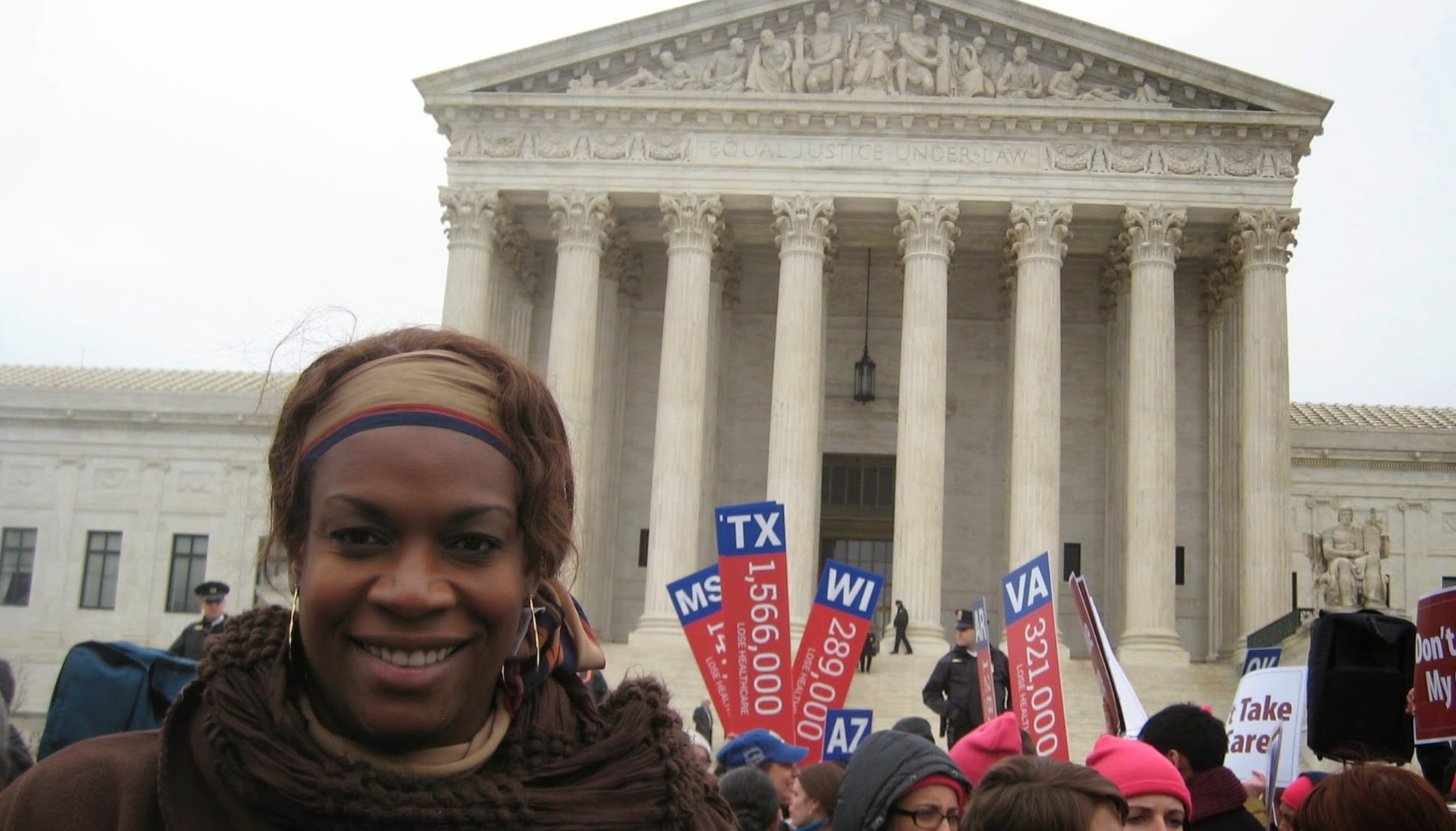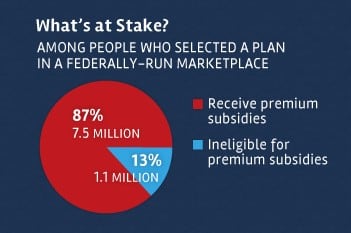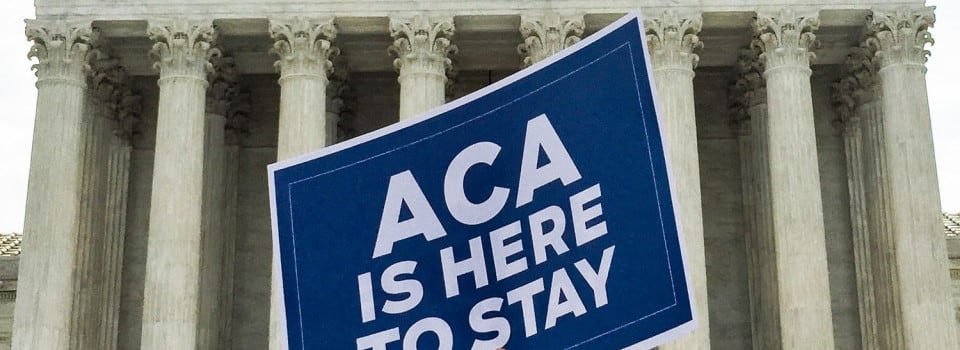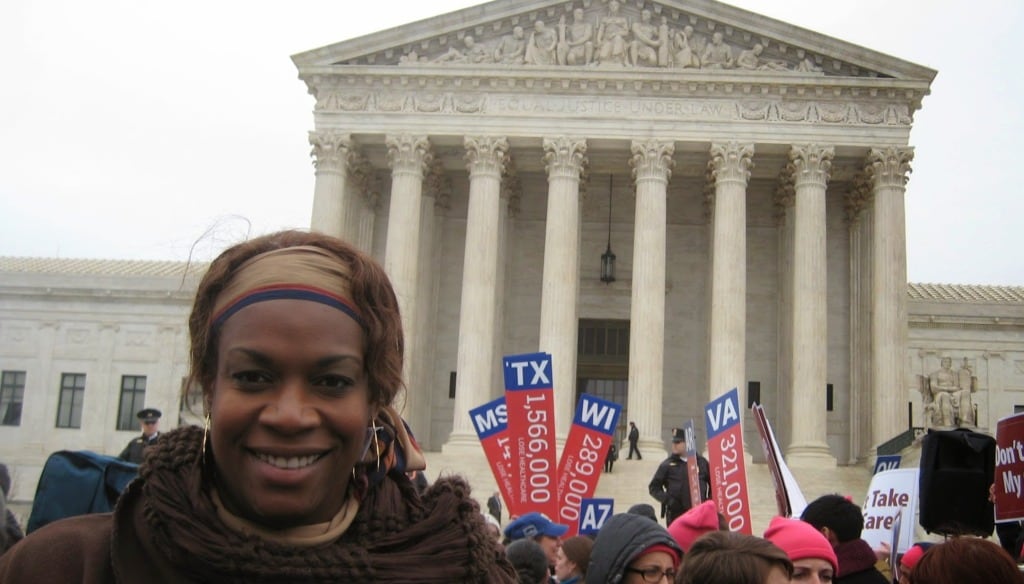
Claudette Newsome traveled from Houston to the U.S. Supreme Court in Washington to show her support for the Affordable Care Act. (Photo: Yanick Rice Lamb/Fierce)
Claudette Newsome celebrated part of her 10-year-old daughter’s birthday and Obamacare in intermittent rain this morning in front of U.S. Supreme Court. Previously uninsured, Newsome traveled from Houston to the nation’s capital with Zoe and her 14-year-old daughter, Alexandria, as part of a group of Texans determined to protect their health-care coverage.
Inside, the justices picked holes in arguments for both sides of King vs. Burwell, the latest of many challenges to the Patient Protection and Affordable Care Act (ACA). By late June, the Supreme Court is expected to decide on the case, which threatens to destabilize Obamacare and impact coverage for nearly 8 million Americans.
The case is essentially a war of words over legislative intent. The plaintiffs question whether the wording in various sections of the ACA really means people should be eligible for tax credits to subsidize the cost of health care purchased through federal exchanges or only through state-run exchanges.
“The choice the state had was establish your own exchange or let the federal government establish it for you,” Justice Sonia Sotomayor reminded the plaintiffs’ attorney, Michael A. Carvin. Roughly three dozen states refused to set up exchanges, including Virginia, the home state of David King and the other plaintiffs.
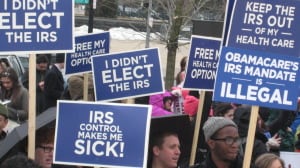
Opponents of the Affordable Care Act protest against tax penalties and credits. (Photo: Yanick Rice Lamb/Fierce)
Because of the federal exchange in Virginia, the plaintiffs contend that they can’t get out of buying health insurance unless they’re willing to pay a tax penalty. The subsidy, which averages $268 nationally, combined with discounted coverage makes them ineligible for the ACA’s unaffordability, or hardship, exemption. However, questions still surround the status of the four plaintiffs.
If the Supreme Court sides with them, it will drive up the cost of insurance and end subsidies for 87 percent of people insured through federal exchanges, according to Avalere Health, which conducts business and policy analysis.
“We’re going to have the death spiral that this system was created to avoid,” Sotomayor said. “States are obligated, insurers are obligated to make sure that in their states — whether they’re part of this program or not — that they have guaranteed coverage.”
Justice Anthony M. Kennedy made similar remarks to Carvin. “There is something very powerful to that point that if your argument is accepted, the states are being told either create your own exchange, or we’ll send your insurance market into a death spiral,” Kennedy said. “There’s a serious constitutional problem if we adopt your argument.”
Without the subsidies, average monthly premiums could skyrocket 122 percent to 774 percent, with Mississippi and Alaska being hardest hit, Avalere projects. Mississippi has the highest concentration of African Americans who obtained insurance through federal exchanges.
“This is particularly alarming in its reach for persons who are ill and lack affordable health care,” said Alfred Chiplin Jr., senior policy attorney at the Center for Medicare Advocacy Inc. in Washington, D.C. “Likewise, one’s ability to participate in the offerings of the ACA toward better health care and a longer more productive life are compromised.”
Newsome wants to avoid reliving such a scenario. Self-employed as a business consultant, she said that 2014 was the first time in nearly two decades that she was able to afford health insurance.
Nineteen years ago, she developed sarcoidosis, an immune disorder that causes inflammatory cells to grow in different parts of the body. “I could not afford a doctor,” Newsome recalled. “I lost my vision. My liver was going bad. My lungs were going bad.”
She had to pay out of pocket to seek treatment for her eyes. “It was expensive; my best friend helped me pay for it.”
In addition, her husband relied on clinical trials for cancer treatment until his death five years ago. They were able to cover their daughters under the Children’s Health Insurance Program (CHIP) in Texas, which helps parents who can’t pay for private insurance, but are ineligible for Medicaid.
Today, Newsome proudly wears an “I Love Obamacare” button that has a red heart. She stands near fellow Texans holding “Don’t Take My Care” signs and trying to drown out their opponents, who chanted “Down With Obamacare” and waved placards reading “Keep the IRS Out of My Health Care.”
“The girls and I have good doctors,” Newsome says with a smile. They’re in a PPO, or Preferred Provider Organization, under the ACA. Newsome wants to keep it that way.
So does Linda Goler Blount, president and CEO of the Black Women’s Health Imperative.
A victory for the plaintiffs would be “catastrophic,” warns Blount, who points out that health insurance saves millions of lives and cuts the mortality rate of women in half.
“We’ve seen cost savings, because people have health insurance,” she adds.
Courtney Christian, director of policy and advocacy for the Black Women’s Health Imperative, worked on Capitol Hill when the ACA was being developed.
“Watching that unfold has been gratifying,” Christian says of President Obama’s health-reform plan. “I think he’s chipping away at the 30-40 million who were previously uninsured.”
Christian disagrees with justices who raised the specter of allowing the plaintiffs to prevail so that Congress could work things out later.
“We can’t count on Congress to fix the problem, especially with the way things have been going on there,” she says.
Justice Samuel Alito Jr. questioned why Congress didn’t explicitly say that an exchange set up by the U.S. Department of Health and Human Services functions as a state exchange, using language similar to that specified for the District of Columbia and U.S. territories.
Justice Antonin Scalia agreed. “This is not the most elegantly drafted statute,” he said, calling some of the sections “gobbledygook.”
U.S. Solicitor General Donald B. Verrilli Jr., who argued on behalf of the government, urged the justices to consider the context of the sections as a whole. Verrilli said that Congress never intended to leave Americans vulnerable and that the lawmakers’ objective was to ensure affordable care. Gutting the ACA, he contends, would gut affordability.
While Scalia and Alito seemed to lean toward the plaintiffs, justices such as Sotomayor, Kennedy, Elena Kagan and Ruth Bader Ginsberg raised questions about jeopardizing coverage for millions of Americans and whether constitutional issues existed. Chief Justice John G. Roberts Jr. was harder to read, but voted in favor of the ACA in 2012. In typical fashion, Clarence Thomas never uttered a word.
“We certainly hope common sense prevails,” Blount says.
Yanick Rice Lamb, an associate professor at Howard University, is co-founder of FierceforBlackWomen.com.
African Americans and the Affordable Care Act
African Americans accounted for 17 percent of the 3.8 million people who specified race or ethnicity when obtaining insurance through federal exchanges during the initial enrollment period from Oct. 1, 2013, though April 19, 2014.
- 1.7 million African-American adults between the ages of 18 and 64 obtained coverage under the Affordable Care Act as of June 2014, leading to a 6.8 percent drop in the uninsured rate of blacks.
- 7.8 million African Americans have been able to take advantage of expanded preventive services since the ACA’s debut.
— Source: U.S. Dept. of Health and Human Services

